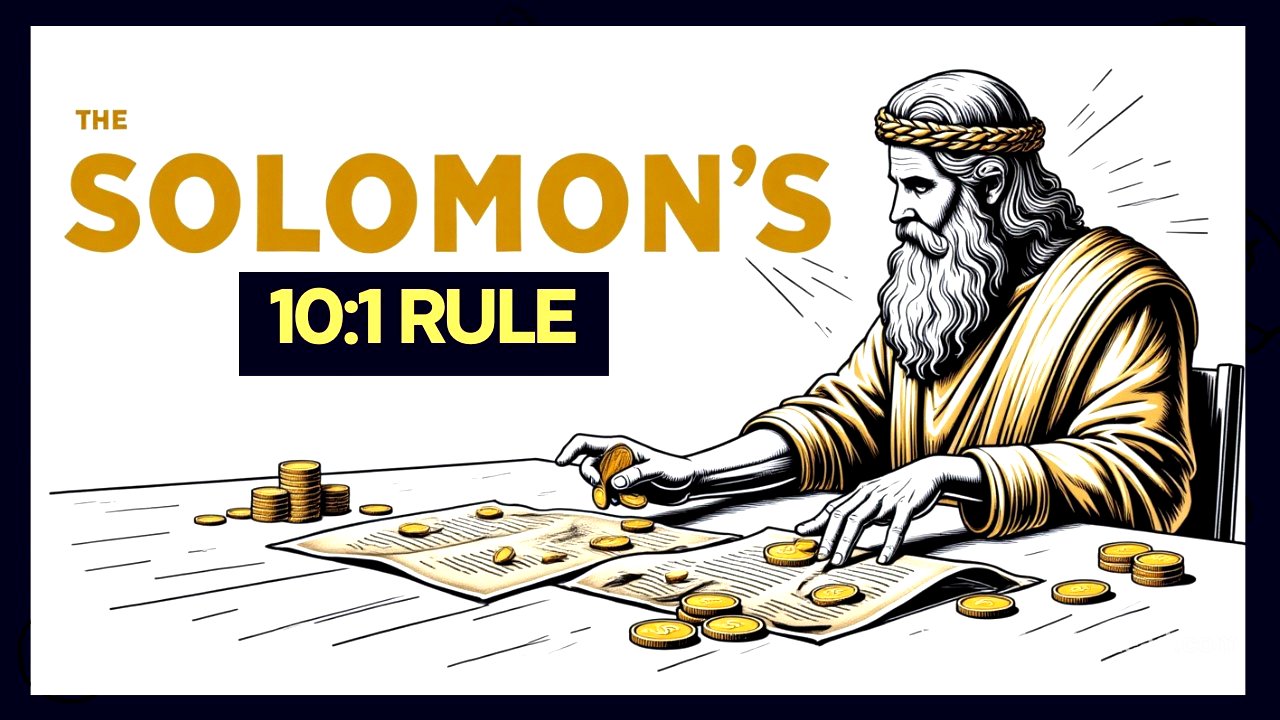TLDR;
This video explores the financial wisdom of King Solomon, emphasizing that true wealth comes from managing and protecting resources wisely, not just earning more. It challenges the conventional hustle-harder mentality, offering a biblical approach to saving that brings freedom and stability. The key principles include self-control, contentment, strategic planning, and generosity, all rooted in faith and stewardship.
- Wealth is a byproduct of wisdom applied to money, not just earning more.
- The real enemy to saving is lifestyle inflation and a scarcity mindset.
- Saving should be driven by faith in God's provision, not fear of lack.
- Planning and assigning purpose to every coin is essential for financial order.
- Consistent habits, like living below your means and avoiding debt, build financial resilience.
Why Solomon's Wealth Wasn't Just About Making Money [0:00]
Solomon's wealth was a result of wisdom applied to money, not merely chasing income. God granted him riches and honor because of his request for understanding. Sustained wealth comes from managing, protecting, and multiplying existing resources. Solomon would focus on understanding his income flow, controlling spending, and aligning transactions with his values, rather than chasing trends. Strategic preservation and self-control are key, avoiding the confusion of abundance with excess. Money should be used purposefully, such as for building, blessing, and maintaining peace. Discipline is essential to avoid financial ruin, even for those with high incomes. A Solomon mindset involves setting up savings plans before spending, diversifying investments, and maintaining an emergency fund. Saving should be motivated by faith in God's provision and a sense of responsibility.
The Hidden Reason Most People Fail at Saving [3:43]
The primary reason people struggle to save isn't low income, but their mindset about money. If you believe money is meant to be spent immediately, you'll never save, regardless of income. Lifestyle inflation, where increased earnings lead to increased spending on non-essential items, is a significant trap. Contentment is crucial to avoid this. Emotional spending, such as on luxury items and vacations, also depletes savings. Undefined savings goals lead to saving whatever is left, which is usually nothing. Saving should be approached strategically, like building a temple, with a plan, timeline, and dedicated resources. Prioritize paying yourself first, even if it's a small percentage, to build a consistent saving habit. Saving should be viewed as essential, an act of stewardship and obedience, rather than optional.
The Biblical Principle of Storing Up Without Fear [6:14]
The Bible portrays storing resources as wise, not greedy, contrasting it with selfish hoarding. Saving should be motivated by stewarding God's provision for future needs, aligning money with divine wisdom. Fear-based saving is driven by a lack of trust in God's provision, while faith-based saving plans wisely, trusting in His supply. Solomon's vast wealth and investments in his kingdom's infrastructure demonstrate that saving doesn't indicate a lack of faith. The storehouse principle, exemplified by Joseph in Genesis 41, involves preparing for future needs during times of abundance. This preparation is a divine strategy, not hoarding. A storehouse can be a savings account, investment portfolio, or stocked pantry. Faith-driven saving enables generosity, allowing you to help others and seize opportunities without debt. Diversifying resources is scriptural, as highlighted in Ecclesiastes 11:2. Storing up without fear involves setting aside a fixed percentage of income for savings and investments while remaining open to giving. This approach keeps money as a servant, not a master, fostering peace and positioning you for kingdom impact.
Solomon's Method: Planning Every Coin Before It's Spent [8:47]
Solomon meticulously planned his wealth, understanding that a kingdom without financial order would collapse. He prepared resources for building the temple with specific destinations for each item. This principle translates to personal finance: every coin needs an assignment before it's spent. This mirrors zero-based budgeting, where income minus expenses equals zero because every dollar is allocated. Solomon directed his wealth intentionally, like a general commanding an army. Many people fail financially by reacting to expenses instead of directing them. Resources should be allocated before spending, eliminating surprises and building stability. A monthly plan should allocate funds for essentials, savings, investments, and giving before discretionary spending. This protects freedom by controlling your money and options. Constant oversight of assets, whether flocks or bank accounts, is essential. Planning every coin makes you ready to respond to opportunities and challenges without panic.
How to Practice Solomon's Saving Habit Today [11:10]
Solomon's saving habit was an intentional rhythm, not a lucky accident, reflecting steady, consistent action. Practicing this today means making saving an automatic habit, not an occasional afterthought. Automation can mirror Solomon's discipline by directing a portion of income into savings or investments immediately upon receiving it. Diversifying resources, like Solomon did with international trade and domestic agriculture, involves splitting savings across short-term liquidity, emergency funds, mid-term investments, and long-term growth assets. Assigning purpose to each savings goal, creating specific storehouses for travel, home repair, retirement, and giving, aligns with Solomon's purposeful allocation of resources. Tracking progress through budgeting apps, spreadsheets, or pen and paper keeps goals in sight and discipline sharp. Balancing wisdom with joy ensures saving isn't about self-denial but about future freedom and generosity.
Four Timeless Habits That Keep Your Finances Strong [13:25]
Solomon's wisdom was grounded in daily habits, the first being living below your means to avoid lifestyle inflation. The second habit is avoiding unnecessary debt, building wealth before spending and resisting high-interest debt. The third habit involves distinguishing between needs and wants, prioritizing value and longevity in purchases. The fourth habit is consistent generosity, understanding that giving strengthens your relationship with God's provision. These habits create financial resilience: living below your means frees up resources for saving, avoiding debt protects what you've built, prioritizing needs ensures efficiency, and generosity aligns your heart with God's kingdom. Solomon's balanced approach integrates these habits into a lifestyle, transforming finances from a struggle to a stable, well-managed kingdom.
From Scarcity to Kingdom Overflow: The Mindset Shift [15:44]
Solomon's wealth stemmed from a mindset of abundance anchored in God's promises, not fear of running out. Scarcity thinking believes there's never enough, while abundance thinking trusts God provides more than enough for His purposes. The shift begins when you treat money as a tool for kingdom work, not your security. A scarcity mindset leads to hoarding or overspending, both avoided by focusing on stewardship. This means saving diligently, investing wisely, and giving generously, knowing your source is unlimited. Kingdom overflow involves planning like Joseph, storing during abundance to meet needs during famine, freeing you from panic during market shifts or unexpected bills. Embrace this shift by setting giving goals alongside saving goals, increasing your giving percentage as your income grows. Tie your finances to God's purposes, seeing opportunities through kingdom thinking, which encourages stepping out in faith with wisdom. Moving from scarcity to overflow aligns your heart with God's economy, making saving part of a joyful mission.









